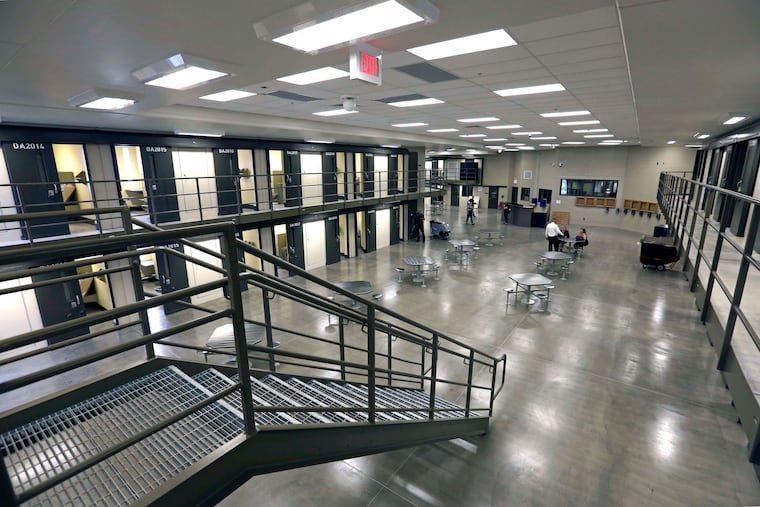COVID-19 imposes a new death sentence in Pa. prisons | Editorial
Prison should not carry the risk of an unintentional death sentence.

Nearly every day this month a person incarcerated in Pennsylvania died of coronavirus.
In the spring and summer, the Pennsylvania Department of Corrections seemed spared while the virus ravaged other prison systems. The DOC oversees 24 state correctional institutions with a current population of 39,000 — an 11% reduction since the beginning of the pandemic.
A recent report by the Council on Criminal Justice found that Pennsylvania was among only six states with a number of COVID-19 deaths in prison lower than would be expected based on the number of deaths statewide.
Tragically to prison staff and people incarcerated, DOC’s luck has run out.
The CCJ report used data through Nov. 13, when 17 people total died of COVID-19 in state prisons. By Dec. 17, the number of deaths grew to 49. Two prison staffers have also died. More than 3,000 incarcerated individuals and 1,000 staff have tested positive since November.
Pennsylvania’s state prisons are not the only ones seeing an increase in cases. Last week, Philly jails went into lockdown after 150 people tested positive in a week. The Philadelphia Federal Detention Center reported more than 200 positive tests since the end of October.
Pennsylvania’s state prisons have been in some form of lockdown or “restricted movement” since March. Currently, people incarcerated have only 40 minutes outside of their cells a day.
Prison should not carry the risk of an unintentional death sentence. There is no current release valve for the state prison population at DOC’s disposal. The only way to let people who are at high risk of death or severe COVID-19 illness out is through reprieve. The governor can’t even unilaterally pardon or commute a sentence without a recommendation from the board of pardons — a slow and at times contentious process that has been utilized more under the leadership of Lt. Gov. John Fetterman but still reviews only a few dozen cases a year.
In April, Gov. Tom Wolf used executive action to establish a temporary reprieve program to reduce the size of the prison population in response to the pandemic. He had earlier rejected a bill that would have capped reprieves at 450 people as too narrow. Wolf’s own reprieve program was written with extremely narrow criteria. Originally, DOC thought that 1,200 people would be eligible. However, just over 100 people were granted reprieve.
» READ MORE: Why Gov. Tom Wolf’s big effort to grant coronavirus reprieves to Pa. inmates came up small
In comparison, New Jersey Gov. Phil Murphy signed an executive order giving emergency release from state prions to more than 800 people in April and the Legislature passed a bill this fall that led to the release of more than 2,000 people in November.
Just as Gov. Wolf established the narrow parameters of the temporary reprieve program back in April with the stroke of a pen, he can and should expand the program now — before more people in the state’s care die.
The General Assembly should not be let off the hook. Currently, “compassionate release” is almost never utilized because of rigid statutory requirements. A bill to create medical parole for the release of the sick and elderly was introduced before the pandemic and never received a committee vote. For a state with an ill and aging prison population, having no medical parole makes no sense — in financial or humanitarian terms.
» READ MORE: Commutations can relieve costs of sick and aging prison population — and reverse decades of bad policy | Editorial
The DOC can also do more. Without visitation, the only way for the coronavirus to cross a prison’s walls is through staff. However, staff in prisons are not required to get routinely tested — despite Center for Disease Control and Prevention guidance. Of the staff that voluntarily got tested, nearly 30% were found positive. Staff haven’t been required to get tested in Philadelphia’s jail or the federal detention center either. To add insult to injury, a state DOC staffer alleges he was called back to work despite having COVID-19 symptoms.
The prison population in Pennsylvania will get the coronavirus vaccine after health-care workers and long-term care residents.
People incarcerated in Pennsylvania don’t have the ability to make choices that will keep them safe. They are at the mercy of prison policies — suffering the consequences of prolonged isolation as well as being surrounded by the coronavirus. Allowing the virus to rage in crowded prisons is not fair to the people who can’t leave or the staff who return to their families when shifts are over.